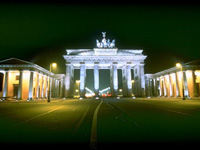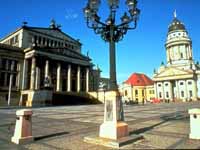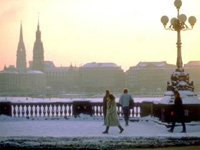Overview Germany

Brandenburg Gate, Berlin © Berlin Tourist Office
As Germany moves forward into the 21st century, leaving behind a history of division and tyranny, it is a nation embracing its newfound liberalism and redefining a modern cultural identity. Yet even today, visitors to the country can't escape feeling profoundly moved by this country's past and the effects it still has on its people.
Situated in the heart of Europe and bordering nine other countries, Germany provides an ideal gateway to any tour of the subcontinent. Its land is wide and varied with turreted castles nestled below snow-capped mountains, lush river valleys, dark and mysterious forests and bustling medieval villages. This is the land of fairy tales, where farmland minstrels headed to Bremen to become musicians, where Sleeping Beauty was woken and Little Red Riding Hood ventured into the woods.
Germany's cities each have something unique to offer the visitor. Each year millions of litres of beer are consumed in Munich during the city's Oktoberfest, where locals and visitors discover true German revelry and 'gemutlichkeit' (a word the locals use to describe a comfortable, sociable environment). Berlin, while still recovering from some of the scars of division, contains many sights from the iconic Brandenburg Gate, to the path of the old Berlin Wall. The city's vibrant nightlife is still evocative of its height in the 1920s and 30s, as characterised by the songs of Marlene Dietrich, the theatre of Brecht and the Film Cabaret.
Discover the country that gave us Beethoven and Bauhaus, Goethe and Glühwein, Lager and Lederhosen - you won't be disappointed.
Berlin
 Why? People travel to Berlin mainly because of a fascination with the resurrection of this city, so long a pariah with its infamous wall which divided it after World War II, its dark period. There is little of the wall to be seen now, and the city is regaining its pre-war reputation as a centre of fun and frolics, the epitome of all that is good and great in German culture.
Why? People travel to Berlin mainly because of a fascination with the resurrection of this city, so long a pariah with its infamous wall which divided it after World War II, its dark period. There is little of the wall to be seen now, and the city is regaining its pre-war reputation as a centre of fun and frolics, the epitome of all that is good and great in German culture.When? Berlin is famed for its long, sunny summers (June to late August) so this is the best time for a Berlin holiday, when outdoor cafes in the parks and gardens (especially the Tiergarten) come alive with events.
Who for? A holiday in Berlin is for the sophisticated fun-lover and culture vultures. Its famous cabarets and nightclubs are in full swing, and its opera and concert venues seldom miss a note. It is also a city of museums and memorials, grist to the mill of those who travel to Berlin for sightseeing.
More Info : Before you travel to Berlin plan your visit using our comprehensive, regularly-updated Berlin travel guide, which is a mine of information on where to eat, what to see and do, what weather to expect, how to use the public transport and a host of other useful facts and figures.For most of the latter part of the 20th century, Berlin has stood as a symbol of the division between East and West, split by the infamous fortified wall erected to separate the socialist sector from the democratic district. When the Berlin Wall was pulled down in 1990 the city discovered that it suddenly had two of everything, most notably two very distinct societies separated both socially and economically. The past decade has seen Berlin embracing unification and rebuilding itself as a modern European capital.
More than 100 streets have been reconnected, and signs of the Wall's existence have all but disappeared. Years of division are still reflected in the new city's architecture, however, with a modern city of skyscrapers, retail centres and urban developments in the West contrasting with most of the pre-War city that remains in the East.
For nearly 30 years the Wall sealed off the imposing Brandenburg Gate from the West, but now traffic passes through it freely. Similarly Alexanderplatz, which was one of the main centres of 1920s Berlin, and later post-war East Germany, has once again become one of the city's focal centres. The site of the infamous Check Point Charlie with its threatening monitoring tower erected to ensure no one crossed over from East to West, is now a museum, and while the tower no longer stands, visitors can see the East Side Gallery, a surviving chunk of the real Wall, now decorated by local artists.
Berlin is once again a vibrant centre for the arts, with many museums, galleries and theatres. At the Kulturforum visitors will find a number of impressive museums and concert venues from the spectacular Berliner Philharmonie concert hall to the complex's Picture Gallery, which houses a vast collection of European paintings from the 13th to 18th centuries.
Berlin still boasts a fantastic nightlife, and while tastes have changed since the height of the cabaret halls of the 1920s and 30s, there is a vast array of venues catering to all tastes. Berlin's calendar is also packed with festivals and parties from the Christopher Street Day gay and lesbian parade in June to the Jazz Fest Berlin in November.
Hamburg
 Why? Of all the cities in Germany, Hamburg is probably the most entertaining for a holiday, with plenty to see and do. Travel to Hamburg for world-class museums, wonderful art galleries, upbeat nightlife, excellent restaurants and first class shopping. Not to be missed during a holiday in Hamburg is a visit to the notorious Reeperbahn red-light district, a favourite haunt for tourists.
Why? Of all the cities in Germany, Hamburg is probably the most entertaining for a holiday, with plenty to see and do. Travel to Hamburg for world-class museums, wonderful art galleries, upbeat nightlife, excellent restaurants and first class shopping. Not to be missed during a holiday in Hamburg is a visit to the notorious Reeperbahn red-light district, a favourite haunt for tourists.When? High season for travel to Hamburg is during the summer months, but the disadvantage of a holiday in Hamburg during this period is that attractions are crowded and prices are at a premium. Summer weather is not particularly appealing for Hamburg is notoriously wet and windy most of the year. The most pleasant season weather-wise to holiday in Hamburg is spring.
Who for? A Hamburg holiday offers something for everyone, from children who will revel in attractions like the world's largest model railway, to raucous groups of young travellers heading for the famous sex shows of the Reeperbahn, and everyone in between.
More Info: Before heading for a holiday in Hamburg consult our helpful Hamburg travel guide, which lists attractions, events and excursions in the city as well as providing detailed basic information like entry requirements, currency and communications.Hamburg is a watery city, geographically, historically and atmospherically. It is Germany's second largest city and lies on the Elbe River, for centuries a major port and trading centre for central Europe. The city has a network of canals that rival those of Venice (it is said to have more bridges than Venice) and is centred on two artificial lakes that take up eight percent of its total area. Probably because of all the water, Hamburg is also known as Germany's 'green city', sporting 1,400 parks and gardens. Modern buildings sit cheek by jowl with historic Baroque and Renaissance architecture, and by night the neon lights dazzle all-night revellers, particularly in the city's notorious red light district, the Reeperbahn.
Hamburg was founded in 810 by Charlemagne and earned its place in history by becoming the most strategic port in the Hanseatic League of North German cities which controlled trade in the Baltic and North Seas between the 13th and 15th centuries. A great fire destroyed much of the city in 1842, and a century later World War II bombing raids again laid it waste, but Hamburg bounced back with style, thanks to the wealth garnered from its position as a trading centre. The city's tourist board claims that Hamburg is now home to more millionaires per capita than any other city in Europe.
Most of the sights of interest to tourists in the city are centred on its maritime traditions, particularly in the harbour area, where the 'Warehouse district' has been transformed into an entertaining destination offering several attractions. Further afield Hamburg is the gateway to the seaside and spa resorts of the Baltic and North Sea coastline.

